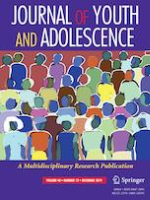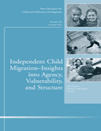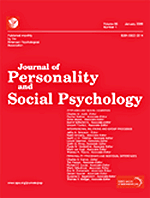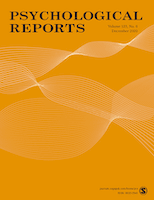
JOURNAL OF GENETIC PSYCHOLOGY
Scope & Guideline
Unraveling the Tapestry of Genetics and Psychology
Introduction
Aims and Scopes
- Developmental Psychology and Behavior:
The journal emphasizes research on developmental psychology, exploring how genetic predispositions and environmental factors shape behavioral outcomes across the lifespan. - Family Dynamics and Parenting:
A significant scope includes studies on parenting styles, parental acceptance-rejection, and their impact on children's emotional and behavioral development. - Emotion Regulation and Mental Health:
Research often investigates the role of emotion regulation in mental health outcomes, particularly in children and adolescents, linking emotional processes to psychological well-being. - Cultural and Social Influences:
The journal highlights the importance of cultural contexts and social relationships, examining how these factors influence behavior and psychological adjustment. - Interpersonal Relationships and Social Development:
The journal also covers themes related to peer relations, bullying, and social competence, focusing on how these dynamics affect developmental trajectories.
Trending and Emerging
- Impact of Digital Environments:
Research focusing on the effects of digital technology, such as social media addiction and its psychological implications, is increasingly prominent, reflecting societal shifts towards digital interaction. - Emotional and Behavioral Interventions:
There is a growing trend towards studies that explore interventions for emotional regulation and behavioral issues, particularly in youth, emphasizing practical applications of research findings. - Cross-Cultural Comparisons:
Emerging themes include cross-cultural studies, examining how varying cultural contexts influence psychological processes and behaviors, highlighting the importance of diversity in psychological research. - Resilience and Coping Mechanisms:
Recent publications show increased interest in resilience and coping strategies, particularly in the context of adverse experiences, reflecting a proactive approach to mental health. - Integration of Psychological Theories:
An emerging trend is the integration of various psychological theories and models, such as the blending of attachment theory with social dynamics, to provide a more comprehensive understanding of behavior.
Declining or Waning
- Traditional Genetic Studies:
There appears to be a decreasing emphasis on purely genetic studies without consideration of environmental interactions, as the field moves towards a more integrative approach. - Sleep Studies in Isolation:
Research specifically focused on sleep issues, such as sleep disorders and their isolated effects, has waned, possibly due to a broader focus on holistic approaches to well-being. - Static Parenting Models:
There is a noticeable decline in studies that only examine static models of parenting, with a shift towards dynamic interactions and their implications for child development.
Similar Journals

JOURNAL OF YOUTH AND ADOLESCENCE
Advancing insights into youth development.Journal of Youth and Adolescence, published by Springer/Plenum Publishers, is a premier scholarly journal that focuses on the developmental issues, behavioral challenges, and social dynamics faced by children and adolescents. Since its inception in 1972, this esteemed journal has provided a critical platform for innovative research, theoretical advancements, and empirical findings within the fields of Developmental Psychology, Educational Psychology, Social Psychology, and broader Social Sciences. With impressive quartile rankings, including Q1 in four distinct categories in 2023, it proudly ranks among the top journals in its field—standing at #21 out of 604 in Social Sciences (Miscellaneous), #88 out of 1543 in Education, and #29 out of 360 in Developmental Psychology. The Journal of Youth and Adolescence is dedicated to advancing knowledge and fostering dialogue among researchers, practitioners, and policymakers interested in youth development, thereby enhancing its impact on educational and social practice. Although the journal currently does not offer open access options, its rigorous peer-review process ensures high-quality publications that contribute significantly to the scholarly community.

New Directions for Child and Adolescent Development
Navigating the complexities of youth psychology and education.New Directions for Child and Adolescent Development, published by Wiley-Hindawi, is a leading journal dedicated to advancing knowledge in the fields of child and adolescent psychology, educational development, and social psychology. With an impressive Q1 ranking in multiple categories—including Developmental and Educational Psychology and Social Psychology—this journal stands at the forefront of research innovation, making significant contributions to understanding developmental processes and challenges faced by children and adolescents. The journal spans a comprehensive publishing history from 1978 to 2023, allowing for a rich dialogue among researchers, practitioners, and students eager to explore emerging trends and methodologies. Researchers can access a wealth of studies and theoretical frameworks, enhancing the journal's stature within the academic community. New Directions for Child and Adolescent Development remains an invaluable resource for anyone committed to improving the lives of younger populations through evidenced-based practices and policies.

SOCIAL DEVELOPMENT
Transforming knowledge into action for social progress.SOCIAL DEVELOPMENT is a prestigious journal published by WILEY, dedicated to advancing knowledge in the fields of developmental and educational psychology, sociology, and political science. With the ISSN 0961-205X and E-ISSN 1467-9507, this journal has been a vital resource since its inception in 1992 and continues to publish high-quality research until 2024. Recognized for its impact, it holds a Q2 ranking in Developmental and Educational Psychology and top Q1 placements in both Social Sciences (Miscellaneous) and Sociology and Political Science for 2023. The journal ranks 103rd out of 604 in the Social Sciences category, reflecting its significant contributions to the discipline. Although it does not offer open access, researchers and scholars can access its compelling articles through institutional subscriptions or direct purchase. Located in the United Kingdom, SOCIAL DEVELOPMENT is committed to fostering an understanding of social dynamics and promoting scholarly discussion on pressing social issues, making it an essential resource for academics, practitioners, and students alike.

Evolutionary Psychology
Innovating Perspectives on Human BehaviorEvolutionary Psychology is a crucial journal published by SAGE Publications Inc, dedicated to exploring the intersection of psychological sciences and evolutionary theory. Established as an Open Access platform since 2003, this journal aims to facilitate the dissemination of groundbreaking research that examines how evolutionary processes shape human behavior and cognitive functions. With a range of articles that cater to various aspects of psychology, especially in fields such as Behavioral Neuroscience, Social Psychology, and general Medicine, the journal holds significant relevance in contemporary academic discourse. Although it currently resides in the lower quartiles (Q4 and Q3) in its respective categories, it provides a vital space for innovative ideas and perspectives, inviting researchers and students to contribute and engage with the rapidly evolving understanding of human psychology through an evolutionary lens. The journal is indexed with an ISSN of 1474-7049, ensuring broad accessibility and outreach to a global audience.

JOURNAL OF PERSONALITY AND SOCIAL PSYCHOLOGY
Pioneering Research in Social Psychology and BeyondJournal of Personality and Social Psychology, published by the American Psychological Association, stands as a premier resource in the fields of social psychology and sociology, offering critical insights into the dynamics of human behavior and interpersonal relationships. With an impressive impact factor and ranked in the top tier of academic journals—Q1 in both Social Psychology and Sociology & Political Science—it consistently attracts high-caliber research submissions that advance theoretical and practical knowledge. Established in 1965, this journal has become a cornerstone for scholars and practitioners alike, facilitating the dissemination of pivotal studies in understanding social influences and individual personalities. As a key player in its field, it is essential reading for anyone involved in psychological research, providing a platform for innovative ideas and comprehensive analyses. Despite its subscription-only access model, its influence is reinforced by its consistently high rankings on Scopus, underscoring its significance by being in the 98th percentile for sociology and the 97th percentile for social psychology. Academics looking to delve into transformative concepts around personality and social interactions will find Journal of Personality and Social Psychology an invaluable addition to their resources.

PSYCHOLOGICAL REVIEW
Driving Critical Analysis in Psychological Research.PSYCHOLOGICAL REVIEW, published by the American Psychological Association, stands as a premier journal within the field of psychology, boasting an impressive track record since its inception in 1894. With an impressive impact factor and a distinguished position in Q1 quartiles for both History and Philosophy of Science and Miscellaneous Psychology, this journal is recognized as a leading source of innovative research and critical analysis. Consistently ranked in the top tier, it holds the 17th position out of 216 in general psychology according to Scopus, reflecting its significance and the high caliber of scholarly contributions it features. While the journal is not open access, it provides comprehensive insights geared towards researchers, professionals, and students keen to deepen their understanding of psychological theories and practices. With a commitment to fostering intellectual discourse, PSYCHOLOGICAL REVIEW is essential for anyone engaged in the evolving landscape of psychological research.

CURRENT PSYCHOLOGY
Illuminating Contemporary Issues in PsychologyCURRENT PSYCHOLOGY is a renowned journal published by SPRINGER, focusing on a myriad of topics within the field of psychology. With its ISSN 1046-1310 and E-ISSN 1936-4733, this journal has established a significant footprint since its inception in 1981. Based in the United States, at One New York Plaza, Suite 4600, New York, NY 10004, CURRENT PSYCHOLOGY caters to an international audience of researchers, professionals, and students seeking to advance their understanding of both theoretical and applied psychology. Rated in the Q1 category for miscellaneous psychology in 2023 and holding a respectable rank of 58 out of 216 in the general psychology field according to Scopus, the journal emphasizes high-quality research and innovation. While it does not currently offer open access, it is committed to disseminating essential insights that address contemporary psychological issues, promoting a deeper engagement with the evolving landscape of psychology.

JOURNAL OF FAMILY PSYCHOLOGY
Bridging research and practice in family psychology.Welcome to the Journal of Family Psychology, a distinguished publication dedicated to advancing knowledge and research in the dynamic field of family psychology. Published by the American Psychological Association, this journal has been a pivotal resource since its inception in 1990, facilitating scholarly discourse and providing insights into the psychological aspects of family relationships. With an impressive ranking in the Q1 category of Psychology (miscellaneous) and a solid position at #97 in the Scopus General Psychology category, it reflects a commitment to high-quality research and impactful scholarship. While the journal isn’t open access, it offers a wealth of information to researchers, professionals, and students interested in the complex interactions within family systems. The Journal of Family Psychology aims to foster a deeper understanding of the roles that family dynamics play in mental health and well-being, making it an essential resource for those looking to contribute to or expand their knowledge in this important area of psychology.

CANADIAN JOURNAL OF BEHAVIOURAL SCIENCE-REVUE CANADIENNE DES SCIENCES DU COMPORTEMENT
Innovating discourse in the realm of psychology.Canadian Journal of Behavioural Science - Revue Canadienne des Sciences du Comportement (ISSN: 0008-400X, E-ISSN: 1879-2669), published by the Canadian Psychological Association, serves as a vital conduit for research and discourse in the dynamic field of psychology. Since its inception in 1973, the journal has been committed to advancing knowledge in behavioral science, offering a platform for empirical studies, theoretical explorations, and practical applications. It notably holds a 2023 Scopus Q2 ranking in the category of Psychology (Miscellaneous), showcasing its influence with a percentile rank of 77th among its peers, and underscores its commitment to quality research. The journal, although utilitarian in shifting between specific years of publication from 1973 to 2024, consistently aims to enhance the understanding of human behavior through rigorous scholarship. Authors and readers alike benefit from the journal's focus on a wide array of interdisciplinary topics, making it an indispensable resource for researchers, professionals, and students dedicated to the intricacies of psychological science. For those looking to remain at the forefront of the behavioral sciences, the Canadian Journal of Behavioural Science continues to be a go-to publication for such endeavors.

PSYCHOLOGICAL REPORTS
Pioneering Empirical Studies in PsychologyPSYCHOLOGICAL REPORTS, published by SAGE PUBLICATIONS INC, is a distinguished journal in the field of psychology, recognized for its contribution to the miscellaneous aspects of the discipline. With an impressive impact factor, this journal plays a pivotal role in disseminating innovative research findings and theoretical advancements, making it an essential resource for researchers, professionals, and students alike. Established in 1965, it continues to provide a platform for high-quality empirical studies and reviews, with a current ranking of #52 out of 216 in Scopus's General Psychology category, placing it in the 76th percentile. Though it operates under a traditional access model, the journal's influence and relevance are underscored by its Q2 category quartile in 2023. Its enduring commitment to fostering academic inquiry and knowledge progression in psychology positions it as a critical publication for those engaged in this dynamic field.